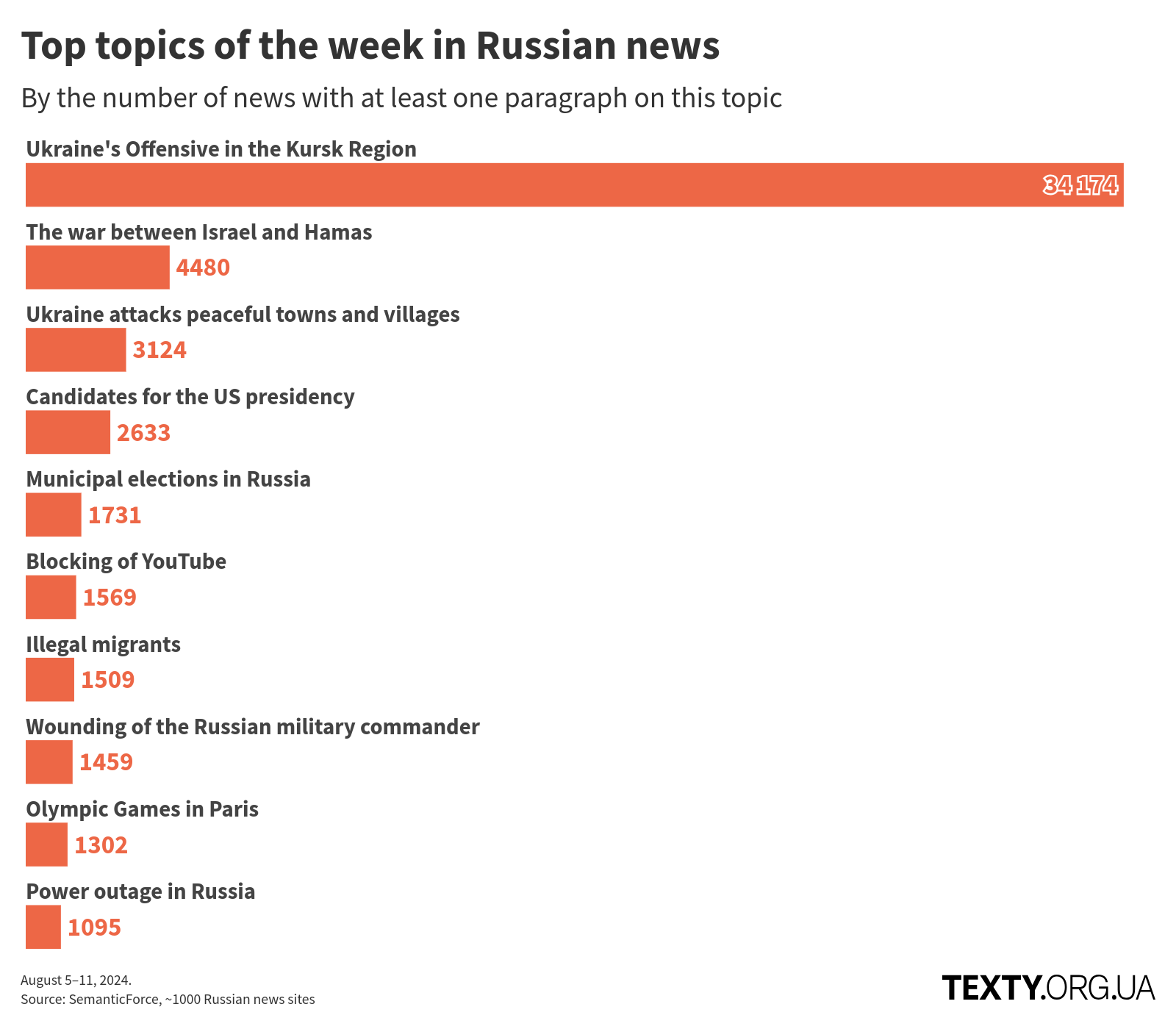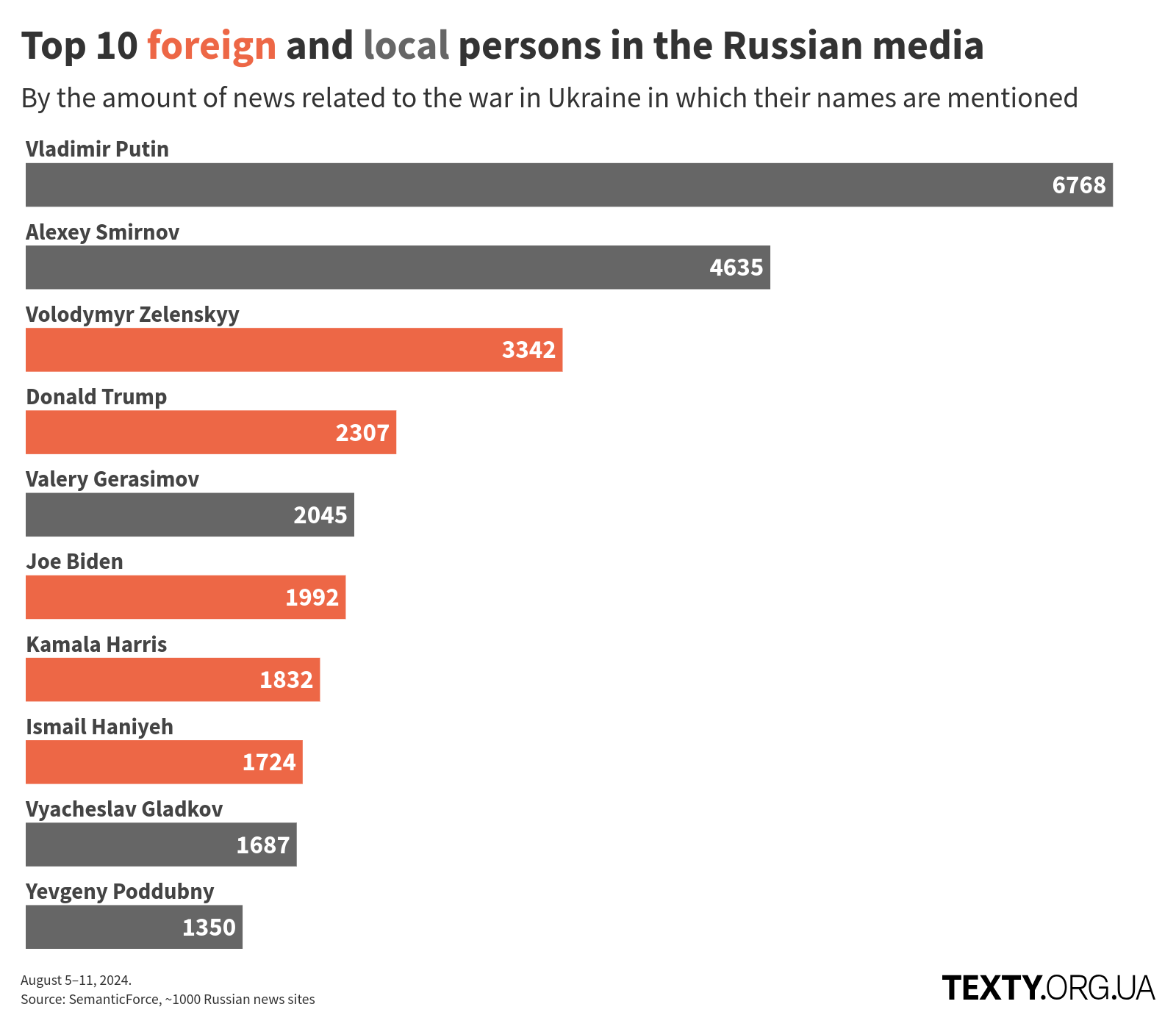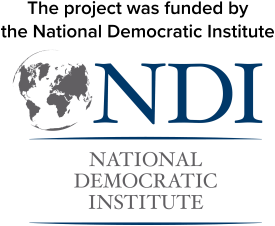Kursk chaos. Russian Media Monitoring Report, August 5-11, 2024
Last week, the Russian media devoted most of its news to Ukraine's offensive in the Kursk region while demonstrating its helplessness. They were afraid to report the facts, so under the guise of news, they offered Russians words of sympathy, reassurance that Putin had everything under control and empty promises of ending the war by the end of the year. They also started spreading scare stories for Ukraine's Western partners about the threat of Ukrainians damaging nuclear power plants in both Kursk and Zaporizhzhia.
Read about this and more in the new issue of our monitoring of Russian state media and manipulative websites that target Russian disinformation.

Kursk chaos and the helplessness of the Russian media
The Ukrainian offensive in the Kursk region has stirred up the Russian information space. It was accompanied by uncoordinated versions and attempts by propagandists to use their standard techniques in a situation in which they had never worked before.
Russian propaganda avoided calling a spade a spade, instead talking about terrorist acts, provocations, or subversive reconnaissance groups (SRGs) in the Kursk region. Instead of advancing Ukrainian troops or seizing settlements, she referred to an abstract "situation". A representative of the Investigative Committee of the Russian Federation reported that "cases have already been opened, in particular, on terrorist acts and murders," as if it were not a war and the advance of the Armed Forces through the territory of Russia, but rather minor internal Russian conflicts.
Clericalism helped to reinforce the feeling that everything was under control and to hide the lack of content in Russian news. This is how they described, for example, the FSB's concerns:
"To ensure the safety of citizens and suppress the threats of terrorist acts by enemy sabotage and reconnaissance units, the chairman of the National Anti-Terrorist Committee, FSB Director Bortnikov, decided to organize counterterrorist operations in the Belgorod, Bryansk, and Kursk regions from August 9, 2024."
In general, Russian propaganda media have consistently demonstrated their inability to meet the basic need for information among Russians. Thus, instead of informing about the course of events, most Russian media outlets spread a mix of open propaganda and “parquetry.” Putin holds meetings and keeps the situation “under personal control.” Russian regions, large cities, and individual politicians like Moscow Mayor Sobyanin write pathetic words of support, express outrage at the actions of the “Kyiv regime,” and announce the collection of humanitarian aid, almost always referring to initiatives from above under the wing of the party or personal initiatives of local officials. But no one says in plain language what actually caused all this.
Instead, little was written about the Ukrainian offensive itself in the first days, chaotically and with maximum propaganda pathos, gradually moving from "the claims of the "seizure" are false and are propaganda of the Kyiv regime" to "all the forces of the Ukrainian army there will be destroyed, and the JFO will end in a Russian victory this year."
Toward the end of the week, the Russian media apparently finally received instructions on responding to the new situation. As a result, Putin became even more in the news, information about a possible advance to the Kursk NPP was minimal, and all efforts were made to push the idea that the Russian government “does not leave anyone in trouble."
One of the most quoted politicians of the week was the acting governor of the Kursk region, Alexei Smirnov. It was written that he "personally controls the situation," and it was on his behalf that the events in the region were reported. Sometimes, just in case, they added: "The Russian Ministry of Defense did not comment on the situation" — a typical Russian strategy of blaming all problems and mistakes on the "boyars," idealizing the central government and Putin personally.

The nuclear threat
Neutral statements inserted in the right context can easily be interpreted as support for the Russian position and criticism of Ukraine's actions. This technique was used by Russian propagandists on the rare occasions when they mentioned the proximity of the new front to the Kursk NPP, while also saying that the IAEA was aware of the situation and was monitoring developments.
To heighten the sense of concern in Europe, propagandists quoted pathetic statements from the Russian Permanent Mission to International Organizations in Vienna: "Ukraine's reckless actions threaten not only the Russian nuclear facility but also jeopardize the entire global nuclear industry."
On August 11, the Russians intensified their narratives about the Kursk NPP and Ukrainians, who could allegedly cause a nuclear disaster with their actions and launched an information campaign at the Zaporizhzhia NPP. After a cloud of black smoke rose over one of the facilities of the Russian-occupied ZNPP, a cooling tower, in the evening, propagandists quickly and organizedly spread the thesis that Ukrainian troops had allegedly "shelled" the plant. At the same time, the head of the Nikopol Regional Military Administration, Yevhen Yevtushenko, said that the Russians had probably set fire to large quantities of car tires in the cooling tower. This version is supported by both the local chat rooms of Enerhodar residents and the fact that the Russians did not allow IAEA experts to enter the cooling tower where the fire occurred.
What else they wrote about
Russian propagandists never tired of discrediting the Summer Olympics
Instead of reporting on the results, they focused on stretched facts and fakes to prove that the Paris Olympics were "one of the most controversial in history" (and not because Russia was not allowed to participate). They continued to spin the "gender scandals" launched by Russia itself, spread the fake about the poisoning of triathletes with water from the Seine, and accused the IOC of Russophobia. They also left the topic for the future: "The United States of America is making every effort to ensure that athletes from Russia do not compete at the 2026 Winter Olympics in Italy."
The offensive by the Ukrainian Armed Forces in the Kursk region has caused an increase in global gas prices
Reproducing Gazprom's statement, they wrote that the Ukrainian Armed Forces' offensive in the Kursk region had increased world gas prices. At the same time, they promoted the idea that a hostile Europe, which is still interested in cheap Russian gas, should condemn Ukraine's actions.
The injury of Russian war correspondent Yevgeny Poddubny
Another event related to the offensive in the Kursk region that was widely reported by Russian media was the injury of Russian military commander Yevgeny Poddubny. The well-known sanctioned propagandist, who had been promoting anti-Ukrainian narratives for the VDTRK media holding since 2014, became an ideal candidate for martyr status after being wounded (an fpv drone flew into his car) and was accused of "obstructing the journalist's professional activities" (there were also accusations of "obstructing the journalist's professional activities").
The news reported about the "favorite of Russia" and how "the whole country was just crying" after the rumors of his death. His "rescue" quickly became a typical heroization, with stories about a local resident who was driving by, noticed Poddubny on the side of the road, dragged him into his car, and managed to get him to the hospital, not even realizing what kind of hero he was actually saving.
If you are interested in receiving an extended version of our monitoring report, please fill out this brief questionnaire.
The Methodology
To monitor the information published on disinformation websites, we analyzed approximately 500,000 news reports collected from ~ 1,000 Russian websites. The data for the analysis was collected and provided by SemanticForce.
Each paragraph was processed using an algorithm which defines its topic automatically. The resulting topics (i.e. groups with similar content) were short-listed by the topics relating to the war or its consequences for Russia. The number of mentions of a certain topic was then counted for each publication. Our conclusions are based on the respective findings and the quotes from paragraphs referring to each topic.

This article was originally written in Ukrainian. It has been translated into English using AI tools such as DeepL, ChatGPT, and Grammarly. If you encounter an error that requires immediate attention, please inform us via Facebook, Twitter, or Instagram. Your understanding and support are appreciated.

